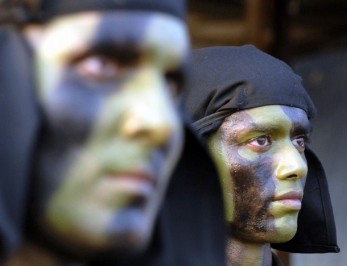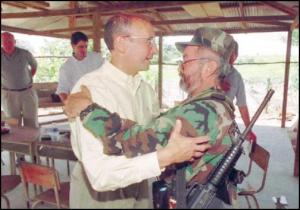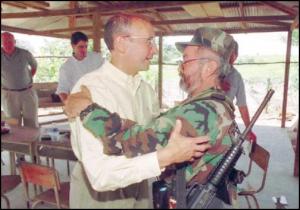By WAYNE MADSEN | WMR | JUNE 2, 2010
“N”, a correspondent from an Iranian media agency, whom I met in the association of foreign journalists in Caracas, told me that he  used to work in Buenos Aires for some time. Things were going well, N’s employer was satisfied with the job he did, and he planned to spend a few more years in Argentine, but eventually had to change his plans. After a while “N” noticed that he was under surveillance and that his mail regularly got stolen. Uninvited guests started to frequent his office. He talked to the local police and counterintelligence service, but both replied they had nothing to do with the problem. They did mention to “N” cautiously that he was in the sphere of interests of «the Zionists». He told me: «The people in my agency in Tehran knew that Iranian citizens often encounter such problems and concluded that the Mossad was planning a provocation against me. This is why I relocated to Venezuela. It is a country friendly to Iran, one enjoys a certain level of security guarantees here and can expect to be protected in case of need».
used to work in Buenos Aires for some time. Things were going well, N’s employer was satisfied with the job he did, and he planned to spend a few more years in Argentine, but eventually had to change his plans. After a while “N” noticed that he was under surveillance and that his mail regularly got stolen. Uninvited guests started to frequent his office. He talked to the local police and counterintelligence service, but both replied they had nothing to do with the problem. They did mention to “N” cautiously that he was in the sphere of interests of «the Zionists». He told me: «The people in my agency in Tehran knew that Iranian citizens often encounter such problems and concluded that the Mossad was planning a provocation against me. This is why I relocated to Venezuela. It is a country friendly to Iran, one enjoys a certain level of security guarantees here and can expect to be protected in case of need».
I had a similar conversation with “F”, a journalist from Syria. He told me frankly that he preferred to stay on the alert even in Venezuela because the Israeli intelligence service watches over all Syrians working in Latin America and often attempts to compromise them. Like most of his countrymen, “F” believes that hostile acts by the Mossad — drugs put in his pocket, allegations of links to Arab terrorists, the emergence of «documentary evidence» of connections to Colombian guerrillas — are likely. “F” said: «I am ready to face whatever happens. I’m not paranoid, I just look at things realistically. I even obtained a gun permit» and showed me a gun he wore under his jacket.
The Mossads’s objectives are listed on its official web site. They include secret collection of operative, political, and strategic information abroad, termination of terrorist activity targeting Israeli and other Jewish installations, prevention of development or acquisition of nuclear weapons by countries hostile to Israel, and covert operations abroad. The January, 2010 killing by the Mossad of the leader of the the paramilitary wing of Hamas Mahmoud al-Mabhouh in a Dubai hotel gives an idea of what the term «covert operations abroad» refers to.
A Mossad hit squad of 11 agents disguised as tourists blocked the corridor leading to the hotel room where al-Mabhouh stayed. Then the Israeli hitmen got inside, electroshocked and strangulated the man. In several hours the Mossad agents left the Emirates with fake British, Canadian, Irish, and Australian passports.
The demonstrative character of the act was supposed to highlight the Mossad’s capability to score with the enemies of Israel in any part of the world. The operation drew extensive coverage in Latin American media, most of which published the photos of the Mossad agents and, of course, that of their chief – the 64 year old Meir Dagan who has long deserved the nickname of «a man with a knife between his teeth». Among other operations, hundreds of killings of Iranian and Iraqi scientists who were involved in military-related research and were regarded as potentially dangerous to Israel are tracked to Dagan.
According to ALAI (Latin America Information Agency), the Mossad is using at least 40 Israeli companies (as well as embassies and other official institutions of the state of Israel) as fronts for its activity. The total number of the Mossad operatives in Latin America is not greater than 100-110, but an extensive network of agents and the cooperation with Jewish organizations and communities ensure the Mossad’s presence across Latin America and the Caribbean.
The Mossad’s interests gravitate to the regions south of the Rio Grande which are densely populated by Arab immigrants. The Mossad analysts believe that the epicenter of the potential «Muslim terrorism» in Latin America is located in the Zone of Three Borders between Paraguay, Argentina, and Brazil. Venezuela’s Isla Margarita, a place where Lebanese and Syrian immigrants hunting for pearls started to settle down in the early XX century, is viewed similarly. When a free trade zone was opened on Margarita Island, the Arab populations switched to selling shoes, textile, and bijouterie. The Venezuelan government was a number of times forced to disprove allegations that Chavez hosts Muslim terrorists. In reality, Margarita is a small island where more or less everybody knows everybody else and no secret activity — least the operation of Hezbollah training camps — is possible.
Over the years of spying on the above «terrorist centers» Mossad never discovered the networks that could present a threat to Israel. Nevertheless, the Mossad’s efforts were not wasted, at least since the Israeli «reliable» data were invariably used by Washington in planning its struggle against terrorism in Latin America. This is the mechanism of ideological support for the establishment of increasing numbers of US military bases on the continent in the proximity of the Latin American countries with «populist» regimes.
In many cases, Israeli intelligence operatives are involved in legal arms trade business which they use to gain connections in local military circles and security services.
The Mossad also uses affiliated companies to advise its Latin American colleagues on fighting terrorism, «leftist extremism», guerrilla groups and their support networks, as well as to help intelligence services modernize their technical base. A company most often mentioned in the context is Israel’s Global CST, whose CEOs are retired high-ranking Mossad operatives. In July, 2009 the Peruvian government hired the company to help reorganize the country’s intelligence community in order to boost the efficiency of its struggle against «subversive and terrorist organizations» including the re-emerging Sendero Luminoso Maoist group. Global CST is also helping the Peruvian government create a joint system of control over mobile communications, Internet, and other communications media.
Global CST has grown notably more active in Colombia. The Israeli company familiarizes the country’s military intelligence and political police (DAS) officers with new techniques in the spheres of anti-terrorist activity and espionage. Over recent years, Columbia’s intelligence services have been increasingly assertive outside the country, evidently imitating the modus operandi of their CIA and Mossad peers. Columbia maintains intelligence networks in Brazil, Ecuador, Mexico, Panama, and other Latin American countries. The FARC and ELN envoys are finding themselves under permanent surveillance, routinely kidnapped and sometimes — assassinated.
International Security Agency (ISA) mainly staffed by former Israeli special forces officers and intelligence operatives is also active in Latin America. The agency (in tight cooperation with the CIA and the Mossad) took part in the coup that displaced M. Zelaya, the legitimate President of Honduras. Currently ISA specialists are working in the security service of the current President of Honduras P. Lobo, who was propelled to presidency as the result of an imitation of free elections like those Washington realized in Iraq and Afghanistan.
There is a consensus among experts that the Mossad’s number one adversary and target in Latin America is Hugo Chavez, the political leader condemning Israel’s attempts to resolve conflicts in the Middle East by force. Chavez suspended Venezuela’s diplomatic relations with Israel in August, 2006, following the Israeli aggression against Lebanon. At that time Israeli Ambassador Shlomo Cohen and the embassy staff (mostly Mossad operatives) left Caracas. In several months Chavez took steps to normalize the relations with Israel, largely in response to the requests made by Venezuela’s 12,000 Jewish community.
The diplomatic relations between Venezuela and Israel were severed again in January, 2009 when the former protested the crimes committed by the Israeli army in the Gaza Strip, where the Israeli operation resulted in the killing of over 1,000 Palestinians, a third of them — children. In a televised address, Chavez criticized Israel as a country guilty of genocide and inhumane persecution of Palestinians. Not surprisingly, Israel’s reaction was negative. In November, 2009 Shimon Peres addressed a thinly veiled threat to Chavez by saying that «Chavez will soon disappear». The Venezuelan leader remarked that Perez had to undertake a long journey to Latin America to say the words and wondered publicly what would have happened if similar words were said about Peres in Venezuela.
TV commentator and former Venezuelan Vice President José Vicente Rangel often warns in his TV show that the Mossad is planning to assassinate Chavez. Agents with the corresponding qualifications were sent to Columbia, Peru, the Dominican Republic, Panama, and Curacao Island. In Rangel’s view, the greatest threat emanates from Colombia as DAS — instigated by the CIA — already conspired quite a few times to kill Chavez. Alarming comments were also made by US journalist Eva Hollinger who is a renown expert in operations against Venezuela. Author of CIA in Venezuela Hose Sant Ross calls the Venezuelan authorities to be mindful of the Mossad’s operations in the country.
As a rule, the efforts of Venezuelan security services to identify the Mossad agents echo with carefully orchestrated protests staged by the country’s Jewish community and with «solidarity» campaigns across Latin America. Media synchronously respond by charging Chavez with antisemitism and collusion with Muslim extremism.
Actually, the theme of antisemitism recurs due to a range of causes, for example whenever the Venezuelan government takes measures to scrutinize the country’s financial sphere. For decades, there used to be a number of jewelry stores in La Francia building in downtown Caracas, not far from the Venezuelan Foreign ministry, where gold and jewelry were bought and sold with practically no fiscal control. The administration’s attempts to make the business take legal shape and to subject the accounting documents of the stores to the long-overdue audit were condemned by the opposition media as persecution of Jewish businessmen. Nevertheless, the announcement of the coming audit had an explosive effect: in a matter of hours La Francia building was completely abandoned. The most valuable stuff was evacuated secretly at night.
Venezuelan counterintelligence agents watched the process from a distance, occasionally taking pictures. They did not expect to learn anything new — it was known that the Mossad used La Francia to carry out its financial transactions.


 used to work in Buenos Aires for some time. Things were going well, N’s employer was satisfied with the job he did, and he planned to spend a few more years in Argentine, but eventually had to change his plans. After a while “N” noticed that he was under surveillance and that his mail regularly got stolen. Uninvited guests started to frequent his office. He talked to the local police and counterintelligence service, but both replied they had nothing to do with the problem. They did mention to “N” cautiously that he was in the sphere of interests of «the Zionists». He told me: «The people in my agency in Tehran knew that Iranian citizens often encounter such problems and concluded that the Mossad was planning a provocation against me. This is why I relocated to Venezuela. It is a country friendly to Iran, one enjoys a certain level of security guarantees here and can expect to be protected in case of need».
used to work in Buenos Aires for some time. Things were going well, N’s employer was satisfied with the job he did, and he planned to spend a few more years in Argentine, but eventually had to change his plans. After a while “N” noticed that he was under surveillance and that his mail regularly got stolen. Uninvited guests started to frequent his office. He talked to the local police and counterintelligence service, but both replied they had nothing to do with the problem. They did mention to “N” cautiously that he was in the sphere of interests of «the Zionists». He told me: «The people in my agency in Tehran knew that Iranian citizens often encounter such problems and concluded that the Mossad was planning a provocation against me. This is why I relocated to Venezuela. It is a country friendly to Iran, one enjoys a certain level of security guarantees here and can expect to be protected in case of need».






